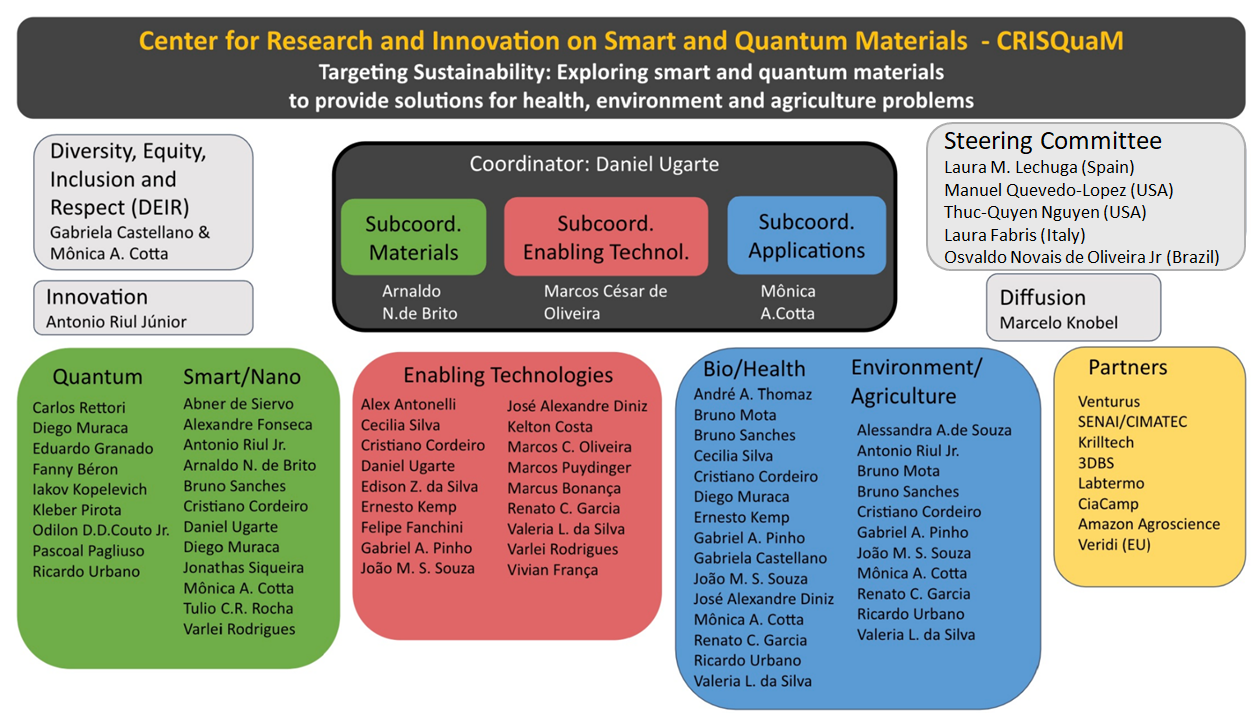BV-FAPESP: research projects supported in this Center
CRISQuaM in the Media: news about the center
CRISQuaM aims to explore the synergistic development of fundamental and applied science to create new materials with high potential for the construction of devices and sensors to address technological challenges related to sustainability, climate change, precision agriculture, ecology, and health. To achieve these goals, we have assembled an interdisciplinary and collaborative research team, integrating expertise across various scientific domains, researching novel materials with high innovation potential. By combining original synthesis methods, advanced characterization techniques, theoretical approaches, computational simulations, quantum technologies, and device construction designs, we aim to drive advances in smart and quantum materials, promoting scientific excellence and technological development. With this, we plan disruptive innovations in instrumentation—including hardware and AI-based tools—as well as in quantum technologies, biomedical devices, and signal processing, in addition to plant bionics, exploring plant-pathogen interactions. Besides research activities, we plan intensive actions in education, dissemination, and communication for the general public, as a modern society should be aware of the challenges humanity faces and how research and technology are essential for responsibly utilizing the planet's limited resources. CRISQuaM's Innovation activities are accelerated through partnerships with several companies in related technologies, many of them Brazilian. Finally, all activities of the Center are managed in accordance with diversity, equity, and inclusion goals and best practices.
The Center brings together scientists, engineers, and innovators in a collaborative effort to apply materials science and quantum technologies at the cutting edge, designing new materials and nano(bio)sensors for advanced diagnostics. The Center has a team capable of producing a wide range of (nano/micro) materials, along with precise chemical and physical characterizations using modern techniques (synchrotron, advanced microscopy, magnetotransport, magnetic resonance, optics, etc.). In addition, the team offers various options in enabling technologies, including miniaturization, processing, and additive manufacturing, as well as instrumentation, quantum sensing, and electronics development. Data analysis will employ updated approaches (numerical simulation, classical and quantum machine learning, and quantum optimization). Applications at the knowledge frontier will address urgent sustainability needs in environmental areas, precision agriculture, plant bionics, and biomedical interfaces, contributing to the development of local technologies in close partnership with the Brazilian industry.
The organization of the Center is based on three pillars — Materials, Enabling Technologies, and Applications — together with partner companies, as described in the figure below.

2024-02-26
Researchers at the Federal University of São Carlos found that glitter’s metal coating reduced the amount of light penetrating water bodies and hence impaired photosynthesis by the Large-flowered waterweed Egeria densa. The problem may impact primary producer organisms at the bottom of the food chain, they warn.
2024-02-21
An interdisciplinary approach tested at the Federal University of São Paulo combined clinical, nutritional, psychological and exercise counseling. The intervention involved remote and in-person sessions, favoring adherence and lowering the cost to the health system.
2024-02-21
The solution developed by the firm, with FAPESP’s support, permits controlled release of sterile males of Aedes aegypti in urban areas with the aim of reducing the population of these mosquitoes.
2024-02-21
The report was written by 53 academic and government specialists, 12 young researchers, and 26 representatives of Indigenous and traditional communities. It aims to be useful to policymakers and to raise the general public’s awareness of the importance of protecting the ocean and coastline.
2024-02-21
The event, which is supported by FAPESP, is for young researchers and environmental technicians. Thirty applicants from Brazil and 30 from other countries will be selected.
2024-02-16
The opossum was found dead in a park in the center of Campinas, a large city in São Paulo state (Brazil), with the same viral variant as fruit-eating bats. These mammals are regularly detected in cities, where they are often attacked by dogs, so they can be considered sentinel species for infectious disease surveillance.
2024-02-16
Researchers at the University of São Paulo analyzed data from 115 children who suffered from conditions considered syndromic (with several associated symptoms) and found a high incidence of overlapping genetic alterations. They argue that identification of genetic mutations can make diagnosis and treatment more accurate.
2024-02-14
A study conducted in a poor suburb of São Paulo city (Brazil) analyzed how low-income communities deal with the hardships deriving from the economic crisis that began in 2014 and worsened during the pandemic.